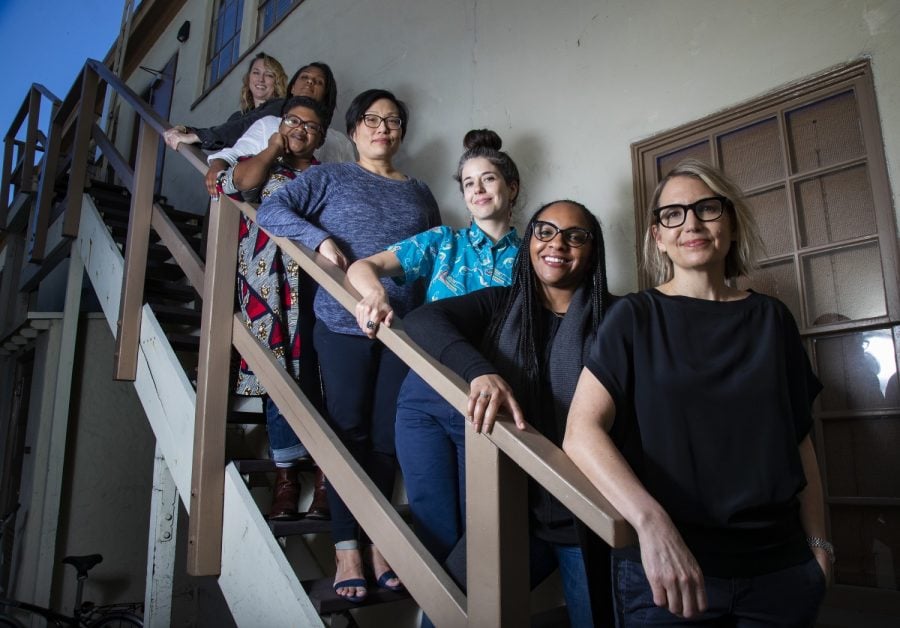Q&A: Northwestern alumna Attica Locke talks executive producing on Emmy nominated show “Little Fires Everywhere”
Courtesy of Gina Ferazzi/Los Angeles Times
Third from left, co-executive producer Attica Locke stands with the writers of Emmy nominated Hulu show “Little Fires Everywhere.”
October 1, 2020
After finding that none of her earlier scripts ever got made into movies, Northwestern alumna Attica Locke (Communication ’95) decided to walk away from Hollywood. Instead, after three years, Locke came back around to writing in Hollywood, landing her a position as co-executive producer of Emmy-nominated show “Little Fires Everywhere.” In addition to producing, Locke has published work as an author and television writer, notably critically-acclaimed novel “Black Water Rising” and Netflix’s “When They See Us.” The Daily sat down with Locke to discuss her work on the show and her reaction to its Emmy nomination.
The conversation has been edited for brevity and clarity.
The Daily: What is “Little Fires Everywhere” about?
Locke: It is about motherhood, race, class and late 90s culture. But it’s essentially a story about a Black mother and her daughter (who) move to Shaker Heights, Ohio, this planned “perfect community.” (They) burst into this White family and (the show examines) how they tangle with each other. There are two daughters ― one of the Black family and one of the White family ― that wish they had each other’s moms. In the midst of this, there’s a trial about an adoption that is being challenged, so lots of things about motherhood.
The Daily: How do you feel about “Little Fires Everywhere” getting nominated for an Emmy?
Locke: I was very happy! I’m very happy ― I think that the show deserves that. I’m super proud of the work that we did, and this just feels like a kind of cherry on top of the whole experience.
The Daily: And did you expect to be nominated for an Emmy at all?
Locke: No, but not because I thought it wasn’t good enough ― I don’t think we said the word “Emmy” ever during any of the process of making the show. We were just trying to make a show that we would watch that we thought people would love (and) would be funny, challenging and deep. In fact, the day of (the) Emmys, I forgot it was even happening and somebody sent me a congratulations text.
The Daily: How did you get the opportunity to be co-executive producer of the show?
Locke: So basically my agent said, “Do you want to go meet on this thing based on ‘Little Fires Everywhere?’” and because I’d read the book, I was like, “Oh yeah, I’ll take the meeting!” I really, really, really loved that book, but at the time I was super busy and I was like, “Ah, I’m probably not going to do it, I just have too much other stuff going on.” But when I sat down to meet with the executive producer, Liz Tigelaar, I simply, within ten minutes, was like, “Oh I’m obviously doing this job.” She’s great. I just liked her a lot. I thought she was calm and smart and funny and grounded and humble, and these are all the kinds of things you’re going to want in a leader and that you’re going to want in an executive producer when you’re working long hours together. You want somebody who’s even-keeled, who’s smart but knows they don’t have all the answers.
The Daily: Since you read the book, how do you feel about how the show is versus the book ― do you think it captured the big themes? What are some of the differences?
Locke: It is definitely different from the book, and that was on purpose. We wanted people who had read the book to not feel like it was just a paint by numbers, that they could find something new in the show. And I think for the most part, it is absolutely the spirit of the show, as rather the spirit of the book to the degree that even when Celeste Ng came to visit our writer’s room, she was pitching on story ideas for things that never appeared in the book, like she kind of went with the idea. She kept calling it like it was a cover of a song that she’d done. It had its efforts, but it had its own kind of different flavor, too. So I think it’s not exactly the book, but it couldn’t have been exactly the book ― that’s not the point of adaptation.
Email: [email protected]
Twitter: @vivianxia7
Related Stories:
— “A Black Lady Sketch Show,” “Little Fires Everywhere” producers among Northwestern alumni nominated for Emmy Awards
― Q&A with Chicago-based author Rebecca Makkai


